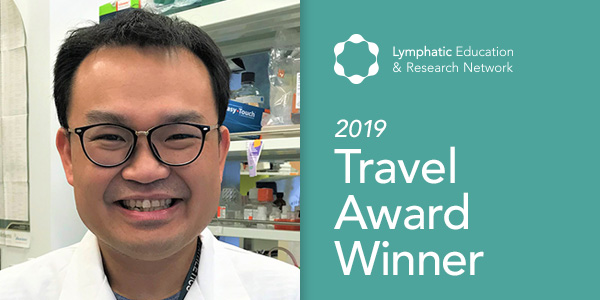Paul “Li-Hao” Huang, currently a research trainee at Washington University School of Medicine, Pathology and Immunology Department, under the supervision of Dr. Gwendalyn Randolph received a Travel Award from LE&RN to attend the Lymphatic Forum in Austin, TX. We asked Paul to share his thoughts on that experience with us and to tell us a bit about his research and future plans.
1. What did you get out of the Lymphatic Forum? Why did you feel it was important to attend?
I really appreciate LE&RN for giving me this Travel Award. I enjoy attending the 2019 Lymphatic Forum because, despite that the focus of the forum is mainly lymphatic-relevant, the research content is indeed broad and includes multiple scientific areas, from which I learned the most recent research findings in the field through talks or poster presentations. Uniquely, contrary to most conferences in which senior Principal Investigators present talks, many trainees, including myself, were invited and encouraged to present the data during this meeting. The opportunity of giving a talk allowed my research to be heard by more people, and allowed me to easily interact with people, to receive their feedback, and to discuss potential future collaborations. I really feel LE&RN puts a lot of effort into supporting trainees by giving Travel Awards so that trainees can go to the meeting. LE&RN really cares about trainees and their career growth. From the Lymphatic Forum, I received great training and friendship to sustain my future career. This year, I was also honored to join the force as an “external pressure” to sign the letter that LE&RN delivered to the Senate to lobby for increased lymphatic research fundings. I found this important and meaningful. I am glad I went to the 2019 Lymphatic Forum and can be included as a part of the community to contribute my support.
2. What are your areas of interest in research?
I am very interested in understanding the process regarding how tissue lipids, including HDL or chylomicron particles, traffic through tissue interstitium back to plasma via the lymphatic route and how immune responses affect this process.
3. What are your hopes and plans for your career and your research?
My career goal is to independently lead a lab and mentor trainees to discover new therapeutics for the treatment of human diseases through the improvement of the lymphatic function.
4. Why do you believe that, in general, lymphatic research is important? What might the field accomplish within the next few years?
There is more and more evidence to show the association between dysfunctional lymphatic vessels or lymphatic malformation and disease pathological conditions. In the near future, I believe the casual relationship between lymphatics and disease pathology will be further studied and explored. Due to the fact that lymphatic vasculature exists in most organs and tissues, it is also important to understand whether disease comorbidity is contributed to by lymphatic malformation/dysfunction.
LE&RN programs, like LE&RN Travel Awards, are only possible because of our Partners and Supporting Members. Become a Supporting Member today.

